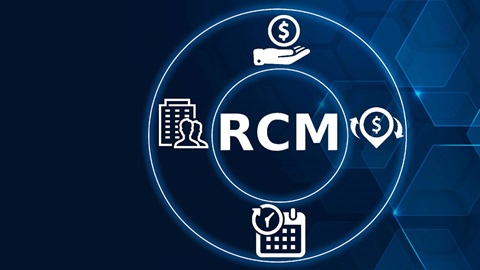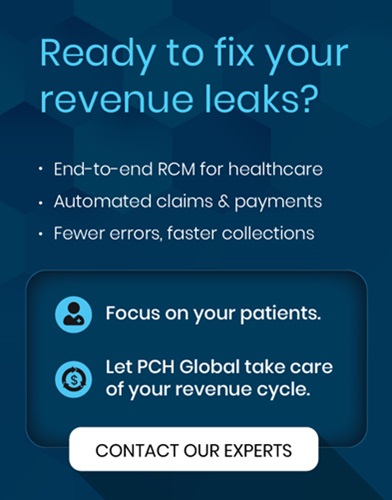
Have you ever wondered why revenue cycle management (RCM) is such a crucial part of healthcare operations? One of the biggest reasons is the financial strain on the industry today. Hospitals and clinics face increased costs, making it more important than ever to simplify billing and payment processes. Healthcare providers could potentially save between $200 billion and $360 billion by integrating AI in revenue cycle management, easing financial pressure and improving efficiency across the board.
What is Revenue Cycle Management?
Revenue Cycle Management (RCM) refers to the entire financial process healthcare organizations use to track patient care revenue. It starts the moment a patient schedules an appointment and continues to include billing, claims processing, and final payment collection. An effective RCM system ensures providers get paid accurately and on time, keeping healthcare facilities financially stable while allowing them to focus on patient care.
Some of the tasks, part of revenue cycle management, are:
- Patient Registration and Eligibility Verification
- Charge Capture and Coding
- Claims Submission and Processing
- Payment Posting and Reconciliation
- Denial Management and Appeals
- Patient Collections
RCM is a complex process, and inefficiencies in any of the above steps can often lead to revenue leakage and delayed reimbursement.
How is AI changing RCM?
AI is playing a major role in plugging the inefficiencies and technological gaps to reduce manual labour and errors and provide predictive analytics to make informed decisions. Here are some of the ways AI is a game-changer for RCM in healthcare:

Automating Patient Eligibility and Prior Authorization Process
One of the earliest steps in the RCM process is determining the patient’s insurance eligibility and whether they have obtained prior authorization. AI tools including generative AI are streamlining the process in a number of ways.
Firstly, they help in analyzing and extracting insurance details in real-time. Secondly, they work towards helping eliminate human errors and claim rejection due to eligibility issues. By leveraging predictive analytics, they help reduce time spent on prior authorization approvals.
Since AI deploys natural language processing (NPL) and Machine Learning (ML), it can quickly parse through the insurance database to determine the eligibility accurately with a faster turnaround time.
Automating Medical Coding and Charge Capture
Accurate medical coding is essential for proper claims submission, since errors in coding can lead to inaccurate claims denials and revenue loss. AI tools can play a significant role in changing that.
The tools can analyse patient records and medical documentations and suggest appropriate medical code for their diagnosis or procedure. Identifying coding errors before claims denials can help make the whole process operationally efficient. Along with this, they can also help in complying with evolving coding regulations such as ICT-10 or CPT updates.
This automated coding process not only ensures that the billing process is accelerated, but also ensures that providers receive accurate reimbursements.
Improving Claims Processing and Denial Management
Claim denials are one of the primary reasons why providers often receive delayed payments, with an increase in administrative workload.
AI can minimize these denials by predicting claim rejection probabilities before submission. It can look into the cases of past denials, to uncover hidden patterns that will aid in decision-making. Once these patterns are analysed, the tools can then help provide real-time corrective suggestions to avoid denials.
Not only that, for denied claims, AI-driven systems can analyse appeal success rates and recommend the best approaches to resolve disputes efficiently.
Predictive analytics for financial forecasting
AI’s predictive analytics abilities can help providers forecast revenue more accurately. It can analyse past billing data and revenue trends to understand if the organization is making sound financial decisions. By taking into account the patient volumes and payer behaviour, it can forecast potential cash flow to make decision-making easier.
It can also provide insights into expected delays and reimbursement timelines. These insights will help healthcare organizations optimize their revenue cycle strategies.
Enhancing Patient Billing and Collections
AI can help make patient billing and collections processes more patient-friendly. For instance, AI-powered chatbots and virtual assistants can send automated payment reminders to expedite the collection process. It can offer personalized payment plans based on the patient’s financial history. According to a Mckinsey report, call centers have already improved productivity by 15% to 30% in providing timely help to the patient, efforts of which can be complemented by AI bots.
AI tools can improve communication by providing real-time support for billing, thus easing the process for the payer. All of this can help improve timely payments and reduce bad debt held by the organization.
Fraud Detection and Compliance Management
Machine learning algorithms can help the fraud detection process tremendously. They can detect anomalies in billing patterns indicative of fraud. They can ensure compliance with HIPAA and GDPR, among other regulatory requirements.
They can reduce the risk associated with inaccurate billing and claims submission. Thus, AI-driven effort can help providers avoid legal complications and financial penalties.
What are the barriers to AI-driven revenue cycle management?
One of the primary barriers to the AI in RCM process is a lack of holistic solutions that can address all of the components of RCM through one single platform. Many technological deployments currently are partial solutions that fail to generate the desired results for impact.
Secondly, there is a huge skills gap in healthcare and especially the RCM process, which spans several departments from technology to reimbursement and finance. This gap halts or slows the implementation, making it difficult for organizations to capitalize on benefits that can be derived from AI. Additionally, the rapidly evolving regulatory environment, and amidst other competing challenges such as electronic health record implementation, there is limited bandwidth for the organization to focus on a holistic solution development.
The lack of effective coordination across the organization is another significant challenge. Revenue cycle teams usually span multiple departments, and cannot function in silos. Since healthcare organizations usually have a complex structure, collaboration despite being necessary is difficult. The existing technological ecosystem needs to be adjusted to support new technologies, and right talent must be acquired to support this development. Without all of these elements, AI adoption in RCM will continue to face challenges.
To overcome these challenges, healthcare organizations must invest in the right mindsets, infrastructure, and capabilities throughout the revenue cycle and beyond. This includes structuring and streamlining the technology ecosystem, deploying talent and expertise that covers relevant areas, and adopting a proactive approach to AI adoption.
PCH Health: A Holistic Solution for Revenue Cycle Management
Choose PCH Health, boasting over 30 years of experience in delivering customizable and scalable solutions tailored to the healthcare system, for your AI in revenue cycle management (RCM) needs. Our comprehensive suite of services includes patient registration, eligibility and benefits verification, prior authorization, medical coding and audits, and billing, all designed to minimize revenue leakage and optimize your cash flow.
With a dedicated team of over 3000 RCM experts providing 24/7 support, we ensure precise patient information entry, timely reimbursements, and increased clean claim submissions. Our advanced technology seamlessly integrates with your existing practice management system, enhancing efficiency and reducing administrative burdens.
By choosing PCH Health, you're not only investing in a service provider but a committed partner focused on accelerating your cash flow, increasing efficiency, minimizing costs, and optimizing revenue, all while maintaining the highest standards of compliance and data security.
DISCLAIMER: The information on this site is for general information purposes only and is not intended to serve as legal advice. Laws governing the subject matter may change quickly and XBP Global cannot guarantee that all the information on this site is current or correct. Should you have specific legal questions about any of the information on this site, you should consult with a licensed attorney in your area.
